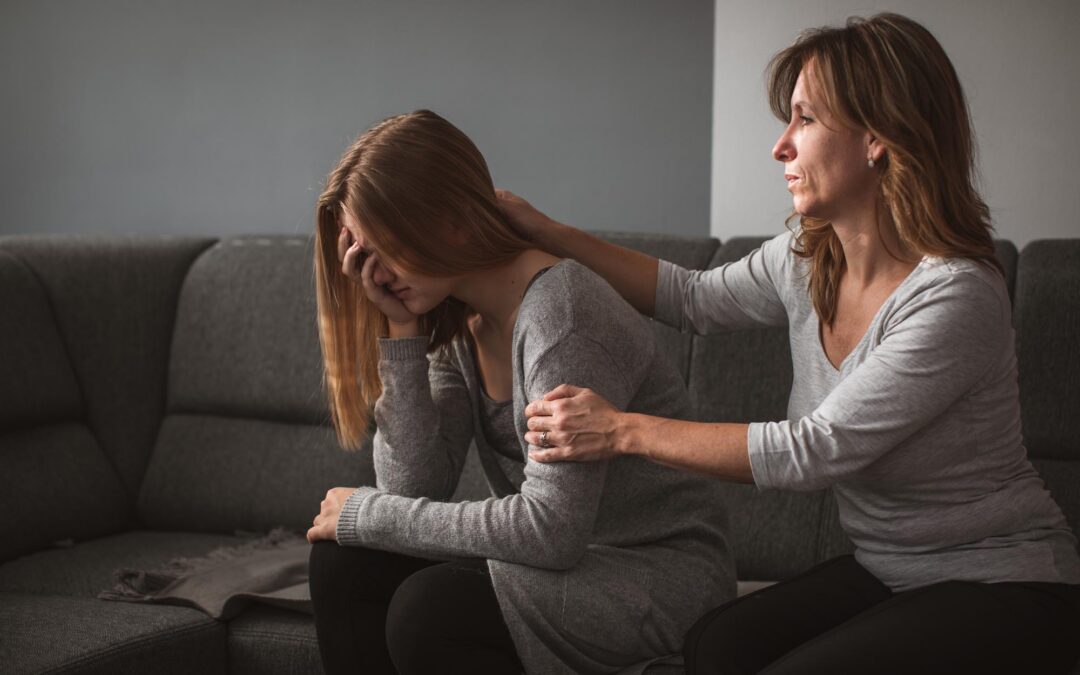Understanding Anxiety Symptoms
Anxiety is your body’s natural alarm system. It activates the fight-or-flight response when you face potential threats or stressful situations. This biological mechanism keeps you alert and helps you respond to challenges in your daily life. Understanding anxiety starts with realizing that occasional worry, nervousness, or fear are completely normal human emotions.
The difference between typical anxiety and anxiety disorders lies in intensity, duration, and impact on your functioning. Normal anxiety may arise before a job interview or important presentation, but anxiety symptoms associated with disorders persist beyond specific triggers and disrupt your ability to work, maintain relationships, or enjoy activities you once loved.
Types of Anxiety Disorders
There are several types of anxiety disorders, each with its own distinct symptom patterns:
- Generalized Anxiety Disorder (GAD) – characterized by persistent, excessive worry about multiple life areas
- Social Anxiety Disorder – involving intense fear of social situations and potential judgment
- Panic Disorder – marked by recurring, unexpected panic attacks
- Specific Phobias – featuring irrational fears of particular objects or situations
- Agoraphobia – involving fear of places or situations where escape might prove difficult
Each disorder presents unique challenges, yet they share common threads of disrupted daily functioning and distressing physical sensations. Recognizing these patterns helps you identify when professional support becomes necessary for managing your symptoms effectively.
Recognizing Common Anxiety Symptoms
Anxiety shows up in various ways, including physical symptoms, emotional signs, and behaviors that can greatly affect your daily life. By understanding these signs, you can recognize when anxiety has gone beyond typical stress reactions.
Physical Symptoms
Your body reacts to anxiety with noticeable changes that you can easily see:
- Increased heart rate, heart palpitations, and chest tightness
- Rapid breathing, shortness of breath, or feeling like you can’t catch your breath
- Excessive sweating, trembling or shaking hands, dizziness or lightheadedness
- Headaches, jaw clenching, or muscle stiffness throughout your body
- Nausea, stomach butterflies, or digestive issues
Emotional Symptoms
Anxiety also brings about emotional distress that impacts your mental well-being:
- Constant worry about future events or outcomes
- Sudden and intense feelings of panic
- Repetitive thoughts that you can’t seem to shake off
- Irritability and mood swings that put a strain on relationships
- A sense of impending doom or catastrophic thinking
Behavioral Signs
The way you behave can also indicate anxiety as you find ways to cope with anxious feelings:
- Avoiding specific situations, places, or people that trigger anxiety
- Feeling restless and unable to sit still or relax
- Putting things off or struggling to make decisions
- Seeking constant reassurance from others
- Experiencing changes in sleep patterns or appetite
Exploring Types of Anxiety Disorders and Their Specific Symptoms
1. Generalized Anxiety Disorder (GAD)
Generalized Anxiety Disorder (GAD) presents with persistent, excessive worry about multiple life areas. Generalized anxiety disorder symptoms include difficulty controlling worry, muscle tension, fatigue, concentration problems, and sleep disturbances. You might find yourself catastrophizing everyday situations or feeling restless without a clear reason. The worry in GAD typically shifts from one concern to another throughout the day.
2. Social Anxiety Disorder
Social Anxiety Disorder centers around intense fear of social judgment and embarrassment. Social anxiety disorder signs manifest as:
- Physical symptoms like blushing, sweating, or trembling in social settings
- Avoidance of social gatherings, public speaking, or meeting new people
- Fear of being watched or evaluated by others
- Anticipatory anxiety before social events
3. Panic Disorder
Panic Disorder involves recurrent, unexpected panic attacks that peak within minutes. Panic disorder features include chest pain, heart palpitations, shortness of breath, dizziness, and feelings of impending doom. You may develop agoraphobia as a result, avoiding places where panic attacks previously occurred.
4. Specific Phobias
Specific Phobias trigger intense fear responses to particular objects or situations like heights, animals, or medical procedures.
5. Agoraphobia
Agoraphobia involves fear of being trapped in situations where escape seems difficult.
6. Selective Mutism
Selective Mutism primarily affects children who speak normally at home but remain silent in specific social settings.
7. Substance-induced Anxiety
Substance-induced anxiety emerges during intoxication or withdrawal from drugs, alcohol, or medications, creating symptoms that mirror other anxiety disorders.
In the case of anticipatory anxiety, it can often be a precursor to panic disorder where the individual experiences intense apprehension about future events which can trigger panic attacks when faced with those situations.
Understanding Causes and Risk Factors for Anxiety Symptoms
Genetic Factors in Anxiety
Genetic factors in anxiety play a significant role in determining your susceptibility to developing anxiety disorders. Research shows that you’re more likely to experience anxiety symptoms if you have family members with similar conditions. Your inherited traits, including temperament and sensitivity to stress, can influence how your nervous system responds to challenging situations.
Personality Characteristics
Personality characteristics contribute substantially to anxiety risk. If you tend toward perfectionism, have low self-esteem, or struggle with uncertainty, you may be more vulnerable to developing persistent worry patterns. People who are naturally more sensitive to their environment often experience heightened anxiety responses.
Traumatic Events and Stressful Life Situations
Traumatic events and stressful life situations serve as powerful anxiety triggers. Childhood abuse, witnessing violence, experiencing accidents, or losing loved ones can create lasting impacts on your stress response system. Current stressors like job loss, relationship problems, or financial difficulties can also precipitate anxiety symptoms.
Medical Conditions
Medical conditions frequently contribute to anxiety development. Thyroid disorders, heart conditions, diabetes, and chronic pain can all manifest with anxiety-like symptoms. Certain medications may also trigger anxious feelings as side effects.
Substance Use and Withdrawal
Substance use and withdrawal represent significant causes of anxiety. Alcohol, caffeine, stimulants, and recreational drugs can either directly cause anxiety symptoms or worsen existing conditions. When you stop using substances your body has become dependent on, withdrawal symptoms often include intense anxiety and panic responses.
Recognizing Complications from Untreated Anxiety Symptoms
Untreated anxiety consequences extend far beyond temporary discomfort, creating a cascade of serious mental and physical health challenges. When you leave anxiety symptoms unaddressed, they frequently trigger secondary conditions that compound your original struggles.
Mental Health Deterioration
The anxiety and depression link represents one of the most common complications you’ll encounter. Persistent worry and fear exhaust your emotional resources, making you vulnerable to depressive episodes. You may find yourself caught in a cycle where anxiety fuels depression, and depression intensifies anxiety symptoms.
Substance misuse often emerges as you attempt to self-medicate overwhelming feelings. Alcohol, prescription medications, or illicit drugs might provide temporary relief, but they ultimately worsen your anxiety and create addiction risks. Sleep disturbances become chronic, with insomnia feeding into heightened anxiety levels during waking hours.
Physical Health Impact
Your body bears the burden of constant stress through:
- Digestive problems including irritable bowel syndrome and stomach ulcers
- Chronic pain in muscles, joints, and headaches
- Cardiovascular strain from prolonged elevated heart rate and blood pressure
- Weakened immune system making you susceptible to frequent illnesses
Social and Professional Consequences
Social isolation from anxiety becomes increasingly severe as you avoid situations that trigger symptoms. You might withdraw from family gatherings, decline social invitations, or struggle to maintain friendships. Professional performance suffers when concentration difficulties, absenteeism, and interpersonal challenges affect your career advancement and job security.
Seeking Diagnosis for Anxiety Disorders Based on Symptoms
Diagnosing anxiety disorders requires a comprehensive approach that relies heavily on clinical expertise and detailed patient evaluation. Healthcare providers begin with an extensive medical history in diagnosis, examining your personal and family mental health background, current medications, substance use patterns, and any traumatic experiences that might contribute to your symptoms.
Unlike many physical conditions, anxiety disorders cannot be identified through blood tests, brain scans, or other laboratory procedures. The absence of specific diagnostic tests means that mental health professionals must rely entirely on symptom assessment and clinical observation to make accurate diagnoses.
Professional evaluation typically involves structured interviews and standardized questionnaires that measure symptom severity and frequency. Your healthcare provider will assess:
- Duration and intensity of anxiety symptoms
- Specific triggers that worsen your condition
- Impact on daily functioning at work, school, or in relationships
- Physical manifestations you experience during anxious episodes
Mental health professionals use established diagnostic criteria from the DSM-5 (Diagnostic and Statistical Manual of Mental Disorders) to determine whether your symptoms meet the threshold for a specific anxiety disorder. This systematic approach ensures that you receive an accurate diagnosis, which becomes the foundation for developing an effective treatment plan tailored to your specific needs and symptom patterns.
Pursuing Evidence-Based Treatments Addressing Anxiety Symptoms
Cognitive-behavioral therapy for anxiety stands as the gold standard treatment approach, targeting the destructive thought patterns that fuel anxiety symptoms. CBT helps you identify negative thinking cycles and replace them with realistic, balanced perspectives. You’ll learn to challenge catastrophic thoughts like “something terrible will happen” and develop practical coping strategies for managing physical symptoms when they arise.
During CBT sessions, your therapist guides you through exposure exercises that gradually reduce your fear response to anxiety triggers. You practice relaxation techniques and develop personalized toolkits for handling panic attacks or overwhelming worry. This evidence-based approach addresses both the cognitive distortions and behavioral avoidances that maintain anxiety disorders.
Dialectical behavior therapy (DBT) offers specialized skills for managing intense emotions and anxiety symptoms. You learn distress tolerance techniques that help you survive crisis moments without making situations worse. DBT’s mindfulness components teach you to observe anxious thoughts without judgment, reducing their power over your daily life.
Motivational interviewing (MI) helps resolve ambivalence about treatment, particularly when anxiety co-occurs with substance use issues. This collaborative approach strengthens your motivation to engage in recovery while respecting your autonomy in making treatment decisions.
Medication-assisted treatment (MAT) may complement therapy when anxiety symptoms significantly impair functioning. Healthcare providers carefully evaluate whether anti-anxiety medications or antidepressants could enhance your therapeutic progress while monitoring for potential interactions with other treatments.
For a more comprehensive approach to mental health conditions, consider seeking help from professionals who offer personalized care using evidence-based therapies. Advanced Therapy Center in Massachusetts provides such services, addressing a wide range of mental health conditions including anxiety.
Exploring Holistic Approaches to Managing Anxiety Symptoms
Holistic therapy for anxiety represents a comprehensive treatment approach that addresses your mental, physical, and spiritual well-being simultaneously. These therapies integrate traditional psychotherapy with alternative methods to create a more complete healing experience.
Core Holistic Techniques
The most effective holistic approaches combine several complementary methods:
- Hypnosis – Helps you access deeper states of relaxation while reprogramming negative thought patterns
- Breathwork – Teaches controlled breathing techniques that activate your parasympathetic nervous system
- Meditation – Develops mindfulness skills to observe anxious thoughts without becoming overwhelmed
How Holistic Methods Reduce Anxiety
Meditation benefits for anxiety extend far beyond simple relaxation. Regular meditation practice rewires your brain’s response to stress by strengthening the prefrontal cortex while calming the amygdala. This neurological shift reduces your body’s fight-or-flight response intensity.
Breathwork techniques specifically target your autonomic nervous system. When you practice deep, rhythmic breathing, you signal your body to shift from stress mode into a calm state. This physiological change decreases cortisol production and lowers your heart rate.
Hypnosis works by accessing your subconscious mind where many anxiety triggers originate. During hypnotic states, you can reframe negative beliefs and install positive coping mechanisms that activate automatically during stressful situations.
These holistic methods create lasting changes in how you process stress and anxiety, providing you with natural tools to manage symptoms without relying solely on medication or traditional talk therapy.
Taking Action: Importance of Early Intervention in Anxiety Treatment
Early intervention in anxiety treatment is your most powerful tool for preventing symptoms from getting worse and staying in control of your mental health. When you deal with anxiety symptoms right away, you greatly lower the chances of developing more serious problems that can affect every part of your life.
Advantages of Seeking Treatment Early
Seeking treatment early offers substantial advantages for your recovery journey:
- You prevent anxiety from becoming deeply entrenched in your daily routines and thought patterns.
- Early treatment helps you develop effective coping strategies before symptoms become overwhelming or lead to additional mental health challenges like depression or substance misuse.
Achieving Symptom Relief with Professional Support
Preventing worsening symptoms becomes achievable through comprehensive professional support. Centers like the Advanced Therapy Center in Massachusetts provide specialized services designed to address anxiety disorders alongside co-occurring conditions. Their approach recognizes that anxiety often intertwines with other mental health concerns, requiring integrated treatment strategies.
Comprehensive Services Available to You
Comprehensive services available to you include:
- Individual counseling tailored to your specific anxiety triggers and symptoms
- Behavioral therapies that target negative thought patterns and avoidance behaviors
- Group therapy sessions connecting you with others facing similar challenges
- Aftercare planning and support ensuring continued progress beyond initial treatment
These mental health resources can help you develop long-term recovery strategies through consistent professional guidance combined with evidence-based therapeutic approaches. You gain access to proven methods like cognitive-behavioral therapy and dialectical behavior therapy, which provide lasting tools for managing anxiety symptoms effectively. Contact (781) 560-6067 to explore treatment options that fit your specific needs.
Empowering Yourself: Self-Care Strategies to Complement Professional Treatment
Self-care for anxiety relief becomes a powerful tool when you combine evidence-based practices with professional treatment. By implementing specific strategies that target anxiety symptoms directly, you can actively participate in your recovery.
Daily Practices That Make a Difference
Mindfulness meditation offers immediate relief from racing thoughts and physical tension. You can start with just five minutes daily, focusing on your breath and observing thoughts without judgment. This practice helps interrupt the cycle of worry that fuels anxiety symptoms.
Regular physical activity serves as a natural anxiety reducer by releasing endorphins and reducing stress hormones. You don’t need intense workouts—a 20-minute walk, yoga session, or dancing can significantly impact your mood and energy levels.
Healthy sleep habits form the foundation of anxiety management. You should aim for 7-9 hours of consistent sleep by:
- Creating a calming bedtime routine
- Avoiding screens one hour before bed
- Keeping your bedroom cool and dark
- Going to bed and waking up at the same time daily
Substances to Avoid
Alcohol and drugs worsen anxiety symptoms despite providing temporary relief. These substances disrupt your brain’s natural chemistry and can trigger panic attacks or increase managing worry naturally becomes more challenging when your system is compromised.
Building Your Support Network
Staying socially connected provides emotional stability during difficult moments. You can maintain relationships through regular check-ins with friends, joining support groups, or participating in community activities. These connections remind you that you’re not alone in your journey toward better mental health.
Managing anxiety symptoms effectively requires a comprehensive approach that combines professional expertise with personal commitment to self-care. You cannot rely solely on therapy sessions or medication to address your anxiety disorders – the most successful outcomes emerge when you actively participate in your recovery through mindfulness practices, regular exercise, and healthy lifestyle choices.
Professional support for managing anxiety provides the foundation you need to understand your symptoms and develop targeted coping strategies. Centers like Advanced Addiction Center in Massachusetts offer evidence-based treatments including CBT, DBT, and holistic therapies that address both anxiety and co-occurring conditions. Their comprehensive approach ensures you receive individualized care tailored to your specific needs.
However, living with anxiety disorders becomes manageable when you seek help early and maintain consistent treatment. The combination of professional guidance and daily self-care practices creates a sustainable path toward symptom reduction and improved quality of life. You deserve support – contact Advanced Therapy Center at (781) 560-6067 to begin your journey toward effective anxiety symptoms management today.





